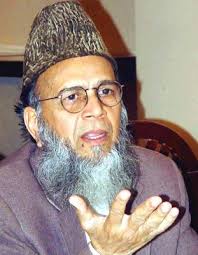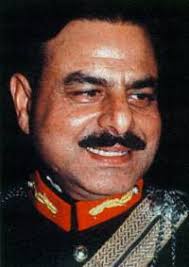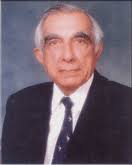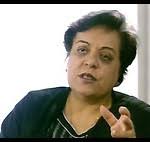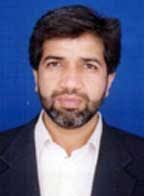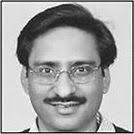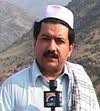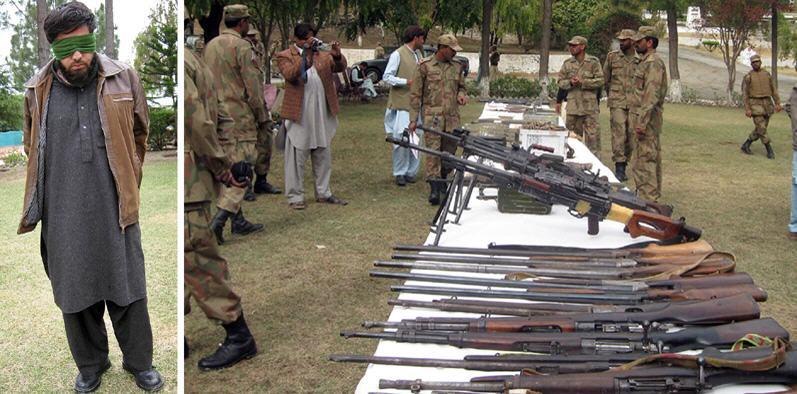


A CJ greeted in Karachi
Guest post by Aal e Hashmat Malik
Just recently, in the last week of November 2009, the Provincial Home Minister of Sindh, Mr Zulfiqar Mirza, announced in a press meeting that his PPP government would launch an inquiry into the events of 12th May 2007 and would like to unveil the real faces behind that utter cruelty.
Let us turn to another page of our forgotten history ……when chaos had gripped the streets ofKarachi on that day. The day when Justice Iftikhar Chaudhry, the then suspended Chief Justice, had landed at Karachi Jinnah International Airport for onward move to Sindh High Court premises to address the Karachi Bar Council. Karachi had witnessed ‘orchestrated mayhem’ wherein about 46 lives were lost, and about 150 were injured, threatening a complete breakdown of law and order in Pakistan's largest and most volatile city.
Referring to UK’s daily The Telegraph’s ‘Pakistan on brink of disaster as Karachi burns’ appearing on 13th May 2007:
‘Karachi With plumes of black smoke billowing over the city of 12 million people, there were extraordinary scenes as gunmen on motorbikes pumped bullets into crowds demonstrating against …………., while police stood by and watched. Bloodstained corpses lay where they had fallen in the streets and bodies piled up in hospital morgues. As the sense of crisis deepened, the military general resolved to send in Pakistan rangers (paramilitary troops) to restore order, and to place the army on standby.
Yesterday's violence erupted as 15,000 police and security forces deployed in the city stood idly by as armed activists from Karachi's ruling party, Muttahida Qaumi Movement (MQM), a coalition ally of Gen Musharraf, blocked Mr Chaudhry's exit from the airport and took control of the city's central district.’,
It was a factual belief that Gen Musharraf had hoped to create a compliant judiciary ahead of elections which he had promised to hold later that year. But what started as a political confrontation then brought up on surface the Karachi's tinderbox of ethnic rivalry.
Referring again to the above quoted article of ‘The Telegraph’;
‘Inside Mr(Justice)Chaudhry's intended destination, Sind's high court, hundreds of lawyers, some of them bloodied after being beaten up by MQM supporters, milled about chanting slogans and receiving news on their mobile phones about the trouble engulfing them. Outside, MQM activists with pistols tucked into their jeans, blocked the entrance.’
The intelligentsia kept a view that Gen Musharraf had purposefully allowed conflicting rallies to go ahead to create the requisite level of disorder to justify the declaration of an emergency or Martial law. The prelude to violence was familiar to Karachi, where hundreds of people were killed in ethnic violence in the 1990s but first time in Pakistan live television cameras captured the situation for viewers to see government tankers used to block off routes to the airport, police and rangers conspicuous by their absence or standing idle as armed men ran amok on the streets of Karachi, corpses and wounded bodies lying by the wayside in pools of blood.
The security plans chalked out for that day were abandoned overnight. The Sindh home department withdrew the weapons of most law enforcement personnel in Karachi. Armed only with batons, the 15,000 policemen deployed in the city avoided the violent areas. Rangers who were to hold key positions on the ‘flyovers’ on the main airport road were nowhere in sight. Instead, armed men in civilian clothes held those posts, and fired into the crowds trying to reach the airport to receive the Chief Justice stranded inside.
Over at the Sindh High Court, as a lawyer Ayesha Tammy Haq witnessed, at about 5 PM the things were getting worse. Judges were not leaving the premises as there would be a rampage. City courts were being attacked. The lawyers were expecting to have army rule in Karachi. Later it transpired that:
‘…. it was a part of “the political activity” of a political party attempting to show its strength to its constituency and of course a loyalty show to see and feel by Gen Musharraf too.’
‘Not only was the Sindh High Court under virtual siege by armed activists, but lawyers attempting enter the Court were repeatedly beaten and roughed up. The armed activists did not even spare the Judges of the High Court. One judge was held at gun point and his car damaged. “While holding me at gun point, the youth called someone and stated ‘Yeh bolta hai kay High Court ka judge hai...kya karun is ka?...achaa theek hai, phir janay daita houn.’ (He says he’s a judge of the High Court. What should I do with him? Ok then, will let him go).” Many judges, unable to drive to the Sindh High Court, had to leave their official ’flag’ cars and make their way through menacing crowds and climb over the court’s back wall in order to reach their chambers.’
(Ref: an interview with Talat Hussain, Aaj TV, 18th May 2007)
[Munir A. Malik and his fellow 24 lawyers accompanying Justice Choudhry from Islamabad to Karachi were forced to remain inside the airport. The Sindh government representatives offered to transport the Chief Justice by helicopter but this offer was for him alone. Since the lawyers with him had already foiled the attempts of ‘two uniformed officers’ to ‘snatch the CJP and take him from the other side,’ he refused.]
(‘Story at the airport’, The News,20th May, 2007)
Armed men attacked lawyers at Malir District Bar, Justice Choudhry’s scheduled first stop in Karachi, killing a lawyer and injuring several others, including female lawyers. Justice Choudhry and his team, of course, were ‘externed’ to Islamabad after arguing and struggling for several hours at the airport. Late that night, residents in the low-income Ranchore Lines mohalla were awakened by loud banging on their doors. One resident narrated that it was two young boys distributing freshly cooked biryani and suji in plastic bags: “Yeh chief justice ki wapsi ki khushi mein hai” (This is to celebrate the Chief Justice’s return [to Islamabad]).
Another account can be seen here:
On the Karachi streets, Uzi’s press card had saved her again at around 05:00 p.m. as she and a colleague tried to reach the Rangers Headquarters in Dawood College. “A car chockfull of ammunition passed in front of us, stopped, backed up and stopped in front of us, Kalashnikovs pointing at the two of us from the windows. We showed our press cards and the car moved on. NEVER in my LIFE have I felt more grateful to my press card than I did yesterday.”
At around 06:00 p.m., she and her colleague were trapped by gunshots all around. “Short of climbing the walls and entering one of the houses around, there really was no other place for us to go.” They stopped a police mobile and asked which way would be safe to go. The answer, accompanied by laughter: “You can be killed wherever you go. Choose your place.”
(Ref: Eyewitness: Karachi 12th May 2007 by Beena Sarwar published in www.Chowk.comdated 30th May 2007)
In published reports, journalists prudently avoided naming the parties involved.
‘Young men toting flags and banners had set up camp outside the airport departure lounge. They hid, however, when policemen came by. Reporters in the vicinity were asked whether they had seen any political activists around. Munawar Pirzada (from Daily Times) said that he had seen some nearby. After the policemen had left, the activists came up to the reporter, dragged him by the hair and took him aside. They then proceeded to threaten him with dire consequences if he said anything the next time the policemen came around.’
(by Urooj Zia in Daily Times, 14th May 2007).
But the affiliation of these gangs was visible in the live coverage provided by several private television channels, which showed plainclothes men brandishing weapons on the deserted roads, using government tankers as cover, exchanging gunfire with unseen opponents, the tri-colour MQM flag visible on their motorcycles.
After Aaj TV’s continuous live coverage of such scenes, armed men attacked the television station, firing at it for several hours. Instead of stopping the coverage, Aaj showed live footage of reporters ducking behind a desk, shots being fired at their office, as anchor Talat Hussain provided an account of the situation on phone. Reporters in the area asked the Rangers posted nearby to help the Aaj workers trapped inside their building. The answer: ‘We’re helpless. We can’t do anything unless we have orders from above.’
Another eye-opening narration:
‘The local media received a call from a hospital, apparently sent by a doctor who had been at work for several hours attending to multiple gunshot wounded victims in his hospital lobby, where a makeshift emergency room had been set up. Nothing but he told: ‘struck down my soul more than what nine fully armed workers of a ‘local political party’ along with 2 sector office bearers did. They tried to drag out a wounded and dying body of a ‘poor politico-religeous worker’ (whose identity they later learnt) for presumably finishing him off.’ The protesting doctors were slapped around and dragged by their legs to the back of the gurney alley. With shotguns, pistols and ak-47’s in hand, the men ran back to the lobby presumably to find their target again.
The doctor ran out to the rangers and police near the hospital front gate. Their answer to his appeal: ‘Jaante ho inn logon ko phir bhi kyon larte ho…hamain upar se order hai ke inn ko char baje tak karne do jo karna hai. Char baje ke baad kuch dekhainge’ (When you know who these people are why do you still fight them … we have orders from above to let them do whatever they want until 4pm. After 4pm we will see).
As a previous party supporter, the doctor had recognized some of the assailants and called a friend related to their deputy leader Farooq Sattar. Five minutes later the men received a phone call and left, threatening the doctors (and stealing one of their cell phones, “Chikna set hai” -- it’s a cool set). “The guy they had come looking for had been shot one more time in the head. The o.t dress we had dressed him in 10 mins earlier was freshly bloody.’
(Ref: www.karachi.metblogs.com/archives/2007)
There was a story behind each of those who were killed, some belonging to one or other political party, and others just because they were there. Masked men stopped ambulances and sprayed them with bullets, killing an Edhi Ambulance driver, Faizur Rahman Khan, 65, when he refused to throw out a wounded person he was transporting to hospital from near the airport; the wounded man was also shot again. Armed gangs herded passers-by into an alley and shot dead a young overlock machine operator along with another man, in front of two colleagues who were also shot but survived to tell the television source.
As per written facts in ‘They shot us one by one...’ by Munawar Pirzada in dailytimes.com.pk, there have been reports about an SHO who guided a procession into an ambush and a pregnant woman who had to deliver her baby in the car when armed men refused to let her proceed to the hospital with her husband. The Pakistan Press Foundation (PPF) reported that several journalists were manhandled and nine wounded. Some TV cameramen were beaten and their cameras snatched or damaged.
Zaffar Abbas was correct when he wrote that Karachi was only at peace for the past many years because it suited its militants; and ‘Finger pointing’ is necessary, because throughout our history, instead of a catharsis, we simply go through a ‘jo ho gaya ab bhool jaao, aagay daikho’ (forget what has happened) attitude. Already, with the President’s pat on the back at the emergency meeting of the ruling party in Islamabad (on Monday) the MQM is back on the front foot…
Although it is unlikely that the perpetrators of Saturday’s violence will ever be brought to justice, at least they should continue to be exposed before the entire country. More importantly, they should face the consequence of such exposure. Public image is very important to the MQM and the national outrage at their conduct may be the best prospect of compelling them to change their ways’.
(Ref: ’Back to the future?’ Published in Daily Dawn of 14th May 2007)
Later Gen Musharraf was in the Chief Minister House Karachi to review the law and order situation following 12th May carnage. At this occasion a Provincial Minister Irfanullah Marwat (from Pakhtun Community) asked Gen Musharraf to order an inquiry into who had opened fire, arrest the culprits and take action against the elements responsible. The minister stressed the people would not be satisfied till the arrest of the elements responsible and strong action against them. The Pakhtun Action Committee Chief Shahi Syed stated on the occasion that all it was due to Adviser to the CM on Home Affairs Waseem Akhtar.
Gen Musharraf heard it and that’s all; military people find it hard to say sorry.
Coming back to our original, Mr Z Mirza, the Sindh Home Minister, was probably pointing out towards this core issue on the basis of his personal knowledge being a staunch political worker of the PPP and may be depending upon the reports of western press as quoted above. Being a Home Minister he had definitely got access to the secret ‘Special Branch’ reports of the Sindh police and floated his wish of conducting this enquiry at such belated stage so vigorously and in a robust manner.
Whether MQM was involved in that whole scenario or not because still it is a subject of detailed enquiry based on solid evidence but one thing is clear that the master mind behind that episode was Gen Musharraf himself, who had claimed those killings as ‘his success and show of power’ in an open jalsa held, organized and patronized by ML(Q) at
Islamabad on the same evening of 12th May 2007.
Would somebody from judiciary or executive dare to hold Gen Musharraf accountable on this issue, too.
(Aal e Hashmat)
Aalehashmat@Hotmail.com
Coming back to our original, Mr Z Mirza, the Sindh Home Minister, was probably pointing out towards this core issue on the basis of his personal knowledge being a staunch political worker of the PPP and may be depending upon the reports of western press as quoted above. Being a Home Minister he had definitely got access to the secret ‘Special Branch’ reports of the Sindh police and floated his wish of conducting this enquiry at such belated stage so vigorously and in a robust manner.
Whether MQM was involved in that whole scenario or not because still it is a subject of detailed enquiry based on solid evidence but one thing is clear that the master mind behind that episode was Gen Musharraf himself, who had claimed those killings as ‘his success and show of power’ in an open jalsa held, organized and patronized by ML(Q) at
Islamabad on the same evening of 12th May 2007.
Would somebody from judiciary or executive dare to hold Gen Musharraf accountable on this issue, too.
(Aal e Hashmat)
Aalehashmat@Hotmail.com
Read more...



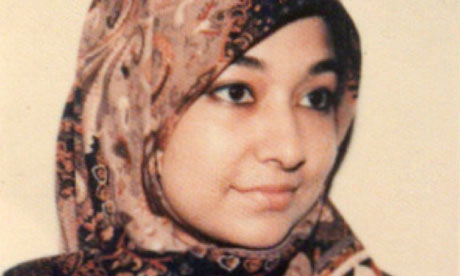
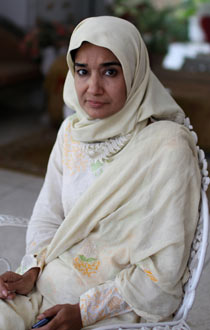
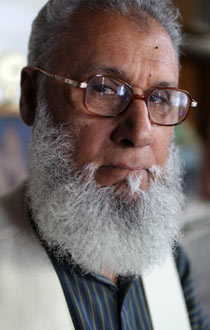


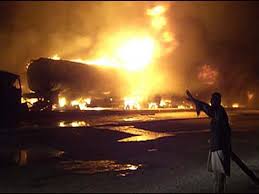
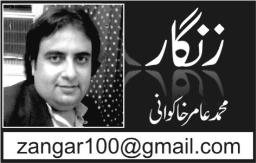
 Muhammad Amir Khakwani
Muhammad Amir Khakwani








